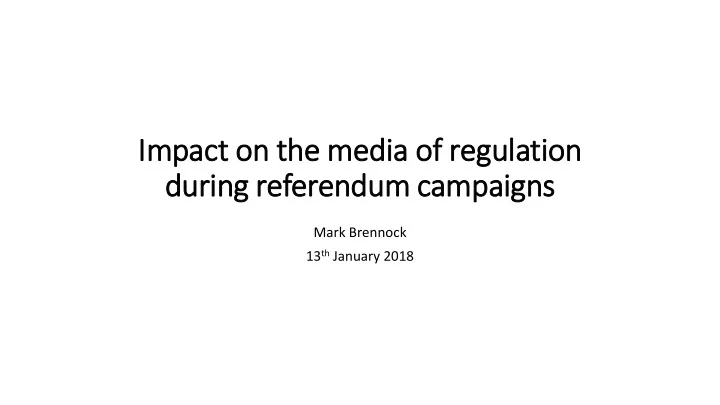

Im Impact on the media of f regulation during referendum campaigns Mark Brennock 13 th January 2018
Is Issues • The role of the media in communicating during a referendum campaign • The regulation of media and how it affects journalists and media during a referendum campaign: How the requirement for balance is interpreted by the media and how it should be interpreted • Does the Referendum Commission have a role in taking on claims made by one side or the other in a campaign if they are simply untrue? • Should regulation apply to other media, not just to broadcasters?
Role of f the media Referendum campaigns are fought substantially through the media
Social media is busier and busier during campaigns…
…But traditional media remains more influential
Regulation of f media • The legal requirement to have balanced coverage applies to broadcasters only, not newspapers or online news outlets • Broadcasters have interpreted the rules to mean they must give 50/50 coverage • This is hard when there are very few voices on one side, and almost all spokespersons on the other side. For example Children referendum, Court of Appeal referendum
Broadcasting Authority of f Ir Ireland guidelines Some room for flexibility BAI issued guidelines for broadcasters before the 2015 Marriage Referendum: • Must be objective, impartial and fair • But “there is no requirement to allocate an absolute equality of airtime” to each side • Balance and fairness can be achieved through choice of contributors, airtime given, scope of debate, structure of programme etc. • Don’t just measure each side’s airtime: focus on the issues, not the clock • No obligation to ‘balance’ each person with an opposing view • It is appropriate that decisions on coverage rest solely with broadcasters
Presenters must seem neutral
Key BAI I guideline “The critical examination of the views of referenda interests campaigning for a particular outcome is not, in and of itself, evidence of a lack of fairness, objectivity and impartiality.”
Role of f the Referendum Commission • to prepare one or more statements containing a general explanation of the subject matter of the referendum proposal; • to publish and distribute these statements in a way that ensures that the electorate becomes aware of them; • and to promote public awareness of the referendum and encourage people to vote.
How the Commission has evolved • Referendum Commission explains the proposal; it doesn’t referee the campaign • Its presence in media has grown steadily • Valuable source of public guidance • Media gives prominence to relevant aspects of the Commission’s explanation
Changes have been proposed • Some past Commissions have said they have not been given enough time to perform their functions. Others have been happy with the time. • Referendum Commission functions could have permanent existence within an Electoral Commission
Should regulation apply to other media too? • Lack of legal requirement for balance and fairness gives newspaper owners significant power to influence outcome • But in liberal democracies, the idea of the State tightly regulating privately-owned media is not always seen as healthy
Media landscape is changing Data source: Reuters Institute Digital News Report (Ireland) 2017 http://fujomedia.eu/wp-content/uploads/2017/06/Report-for-Web.pdf
Some conclusions • Requirement for balance, fairness and impartiality applies to broadcasters, not newspapers or online outlets • Broadcasting remains the most influential outlet. Despite the rise of online and social media sources, radio and television remain hugely influential • Broadcasting Authority of Ireland made clear in its guidelines for the most recent referendum that “balance” does not mean that coverage should be split precisely 50/50 between the yes and no sides • Guidelines seem to offer more flexibility to journalists, but there is a very understandable culture of caution among journalists • The Referendum Commission is a well-regarded voice, but does not intervene in the campaign debate on a regular basis. • There are proposals for consideration on giving Referendum Commission functions to a permanent Electoral Commission, and guaranteeing more time for the Commission to perform its functions
Recommend
More recommend